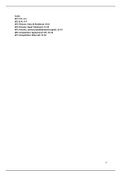Judgments
EU Law II: Substantive Law of the EU. - Important cases
- Course
- Institution
- Book
EU Law II: Substantive Law of the EU. Important cases discussed in the course EU Law II: Substantive Law of the EU. of the Bachelor European Studies at Maastricht University. ALSO very useful for students from other related bachelor studies or master studies. Covering ALL important cases of EU La...
[Show more]




